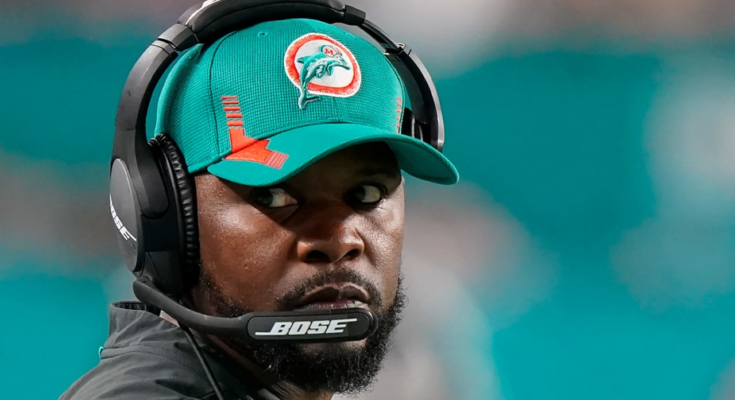At least a dozen minority coaches and personnel people were contacted for this story, and none wanted to speak on the record for fear it could impact job security or mobility. However, there was unanimity among them that sham interviews and racial discrimination are part of the NFL hiring process. Said one personnel person of the lawsuit: “It’s probably going to air out a lot of dirty laundry. What happened to [Flores] has been going on for decades, but no one has ever wanted to push the issue. Most have been happy to have the opportunity to work in the league and haven’t wanted to walk away from that opportunity. I admire his resolve.”
Not all have been willing to go along with the status quo. Clarence Shelmon spent a decade and a half as an assistant coach in the college ranks before jumping to the NFL, where from 1991 through 2011 he was a position coach for some of the game’s top running backs, including Emmitt Smith and LaDainian Tomlinson. From 2007 through 2011, he was the offensive coordinator of the Chargers, who ranked in the top five in scoring during each of those five seasons and went to the playoffs three times, including a trip to the AFC Championship Game. As Shelmon’s career progressed, he dreamed of becoming a head coach. But the higher he climbed on the occupational ladder, the farther he says he found himself from his desired destination. So in 2012, having never been offered a single interview for a head-coaching position, he walked away from the game.
“It’s emasculating. It’s devastating,” Shelmon said of the unequal playing field. “You work tremendous hours and you produce, then you see guys come into the game that have coached three years or they’re sons of somebody else, and next thing you know, they’re a head coach and you’re not. You’ve been busting your ass all these years and you can’t even get an interview. It really plays with your mind. You realize that you really don’t have a chance. It’s almost paralyzing.
“Part of the problem is that most coaches can’t do anything about it because they need that salary. So they play the good soldier and they go on. But I was different. When I realized how this thing operated, I saved my money and I invested my money and I walked away on my terms. As much as I loved the game, which had given me everything, including my education, I could no longer look at myself in the mirror and know that I’m going along with this systemic racism. It’s real, what Brian Flores is saying.”
So real that other Black coaches privately admitted to NFL.com over the last week that they have considered leaving the game because they feel there is not a credible path to advancement at the highest levels. If Shelmon’s story does nothing else, it speaks to the fact that the pain and trauma of discrimination stays with these coaches well after they retire. It has been a decade since Shelmon departed, yet the cuts have yet to heal.
Last year at this time, I was working on a story about the lack of diversity among head coaches in the NFL. The focus was primarily on the offensive coordinators who were set to face off in Super Bowl LV: Byron Leftwich of the Buccaneers and Eric Bieniemy of the Chiefs. At the time, Leftwich had never interviewed for a head-coaching position, while Bieniemy had completed nearly a dozen interviews but never gotten a job — despite being part of a team that was in its second consecutive Super Bowl and coordinating an offense that featured quarterback Patrick Mahomes, the reigning Super Bowl MVP and former league MVP.
It was hard not to liken Bieniemy’s plight to that of Sherman Lewis. Bieniemy was an All-America running back at Colorado, just as Lewis was an All-America running back at Michigan State. Bieniemy transitioned into coaching and broke into the NFL as a running backs coach, just as Lewis did when he vaulted into the pros in 1983. Bieniemy worked his way up to coordinator just as Lewis had worked his way up, and Bieniemy won a Super Bowl as a coordinator just as Lewis did, though Lewis won four rings total over the course of his NFL coaching career.
But perhaps the most striking similarity between the two is how they both watched white coaches from their respective teams’ staffs get opportunities to be head coaches while they did not. In fact, five offensive assistants who began their Packers tenures with titles lower than Lewis’ coordinator role during his eight seasons in Green Bay eventually went on to become head coaches: Jon Gruden (who started in Green Bay as an offensive assistant), Steve Mariucci (quarterbacks coach), Andy Reid (assistant offensive line/tight ends coach), Marty Mornhinweg (offensive assistant/quality control coach) and Mike Sherman (assistant offensive line/tight ends coach).
I tried multiple times to reach Lewis for that story — he last coached for Washington in 2009 — but he did not return the calls. Some friends who remain in contact with Lewis suggested the subject might be too painful for him to discuss, which is often the overlooked element of this story. The psychological pain of discrimination lingers long after these men leave the game, despite the fact that the league has made a push in recent years to focus on the importance of mental health.


